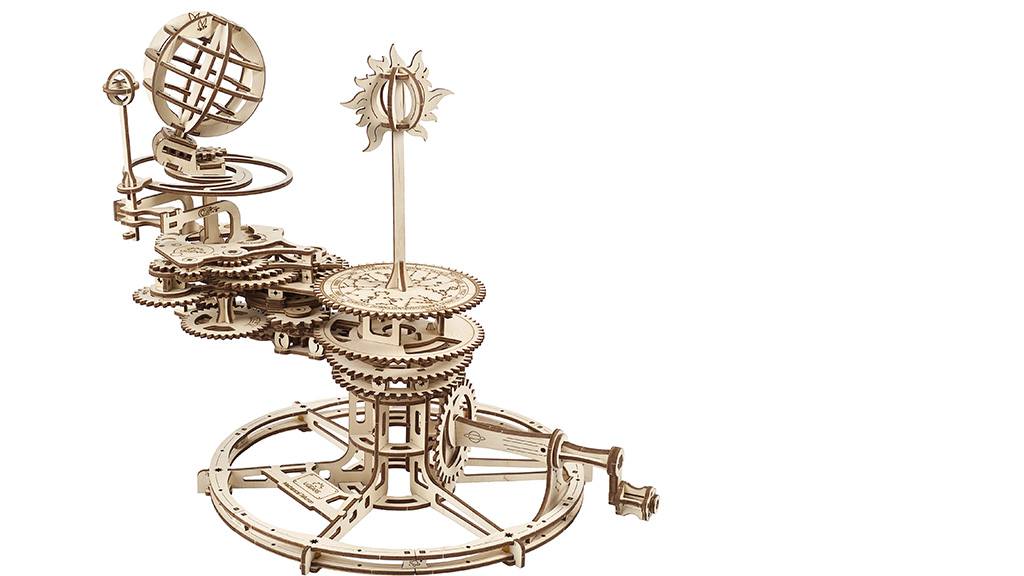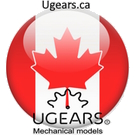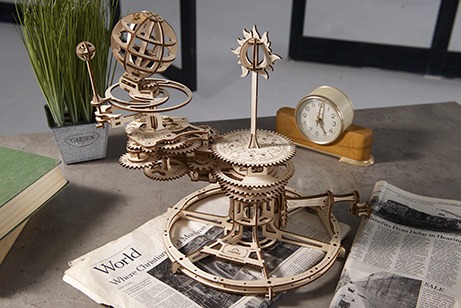

The idea of a space-themed model has been "floating in the ether" at Ugears for some time now. Every time we announce a new model, hopeful Ugears fans will ask, "Is it an orrery?" From this shared desire, a project was born. Our mission: to spread knowledge of space and time by helping people visualize the movements of the planet we live on, and its closest satellite, the moon.
Ugears is proud to present the Mechanical Tellurion, an accurate wooden model representation of our corner of the universe. A tellurion (also spelled tellurian, tellurium, and sometimes called a loxocosm), is an ingenious mechanism that depicts the cosmic dance between Sun, Earth, and Moon. The causes of day and night, the phases of the moon, and the changing seasons are seen and understood according to the movements of this 3D puzzle. A tellurion (from the Latin tellus, meaning "earth") is related to the orrery, which illustrates the relative positions and motions of the planets and moons in the solar system in a heliocentric model.
What is my place in the universe? Where am I going? We can't help you with the metaphysical aspect of these questions, but this wooden puzzle will help you understand the voyages you make as a passenger on planet Earth, and your interconnected relationship with some of your nearest celestial neighbors. We all experience the regular cycles of day and night, the phases of the moon, the changing of the seasons, and the passing of the years. But how many of us truly understand these phenomena, or can explain what's behind the clocks and calendars that rule our lives? Any child can tell you how old they are, but ask a child how many times they've circled the sun, and you might get a puzzled look or an amusing range of answers: A hundred twenty-seven? Ten thousand? Once? Never?
Build the beguiling DIY wooden model Tellurion, enjoy showing it to your family and friends, and you will all have a better understanding of the heavens, the seasons, and the concept of time itself. Turn the handle to set the closely calibrated system of gears in motion. One turn of the handle = one rotation of the earth on its axis = one day. Point to a spot on Earth's surface, observe the spinning earth's position relative to the sun and visualize sunrise and sunset, the passage of day into night. The Tellurion shows the phases of the moon are a function of the moon's position relative to the sun and earth. When rotating, the moon rises and falls slightly, thereby changing its trajectory. The earth's orbit around the sun, together with a correct depiction of the 23.5-degree inclined orientation of the earth on its axis, shows why we experience changing seasons (outside the equatorial regions). The Tellurion charts the passage of the seasons, while also giving a handsome graphic representation of the zodiac, showing the sign and constellation under which you were born.
The Ugears Mechanical Tellurion can be manually adjusted or "tuned" to provide an accurate depiction of the relative positions of the sun, earth, and moon on any given day. When "tuning" the mechanism, set the pointer to the middle of winter or summer on the seasons dial. The earth, on its tilted axis, can be rotated (using a gear under the phases of the moon) to have either hemisphere be farthest from the sun in the bleak midwinter, or closest to the sun in summer. Turn the handle the correct number of days forward or back, from whichever solstice is closest in time, to set the present day. After consulting a lunar calendar, use the upper gear disk to adjust the position of the moon to its correct phase. Your Tellurion is now "set." With each passing day, give the model one turn of the crank to chart the earth's progress around the sun, and the moon's lunar cycle as it orbits the earth.
As you study the movements of your Ugears model Tellurion, you will learn that the full moon occurs when the moon is behind the earth, away from the sun. This is because the sun illuminates the entire surface of the moon that is visible to us (the "bright side" of the moon). In contrast, when the moon is between the earth and the sun, the sun's rays illuminate that part of the moon that is turned away from us (the "dark side" of the moon). We call this phase the "new moon," the period when the moon is not visible in the night sky. In the intervals between these phases, the moon waxes and wanes, changing its apparent shape, depending on how much of the illuminated part we can observe from the earth. The phases of the moon are just one of many somewhat counterintuitive astronomic understandings that are easy to visualize with the Ugears Tellurion 3D puzzle.
.jpg)
At Ugears, a rough approximation, or "close enough," isn't really our style. In representing the orbital periods of our planet and the moon, our design engineers have given the Mechanical Tellurion a sophisticated gear system (first worked out by Dutch mathematician Christiaan Huygens in the 17th C) to have the most accurate approximations possible in a wooden mechanism at this scale. The earth gearing has a 365.256-day orbital period, while the moon-earth gear system has an orbital period of 27.323, giving accuracies within one-thousandth of a day.
The Ugears Mechanical Tellurion DIY model kit comes with 249 parts and is rated "Medium," with an estimated construction time of 5 hours. This 3D representation of the earth's movements and its interplay with nearby celestial bodies will appeal to anyone interested in space, astronomy, skywatching, or to those wanting to understand, or teach a child, the basic natural phenomena that rule our lives: day/night, the seasons, the lunar cycle, and the construct of time. The Tellurion is a great DIY project or gift idea for any hobbyist or budding astronomer. We are pleased to finally bring this beautiful tellurion/orrery 3D model to Ugears fans all around the world—the world we spin on together.

Model size: 15.9*10.2*12 in (40.5*26*30.5 cm)
Package size: 14.9*6.7*1.3 in (37.8*17*3.4 cm)
There are no reviews for this product.

Assembling without glue and chemicals

Details are already cut and ready to assemble

The models produce motion

Perfect for family projects through hands-on STEM learning